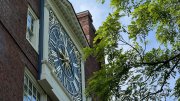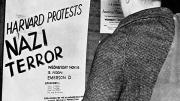Federal Judge Allison Burroughs has extended a temporary restraining order blocking President Donald J. Trump’s travel ban on Harvard’s international students until June 23. At a hearing Monday, Burroughs said she plans to issue a decision within a week on whether to impose a longer-term preliminary injunction barring the policy.
The hearing marks the latest development in the federal government’s multi-pronged effort to prevent Harvard from enrolling international students. On May 22, the Department of Homeland Security (DHS) announced it was revoking Harvard’s Student and Exchange Visitor Program (SEVP) certification, stripping the University of its ability to host international students. Harvard sued, and Burroughs temporarily blocked that policy from taking effect.
Days later, the Trump administration shifted tactics: on May 28, DHS issued a 30-day notice of intent to withdraw Harvard’s SEVP certification—a move aimed at countering Harvard’s argument that the initial revocation violated administrative procedures by bypassing due process.
At a May 29 hearing, Burroughs extended the temporary block and directed Harvard and the federal government to propose terms for a preliminary injunction. At that hearing, government attorney Tiberius Davis argued that an injunction was no longer necessary because of the 30-day notice of intent to withdraw. He also said that a broader injunction could infringe on the government’s rights—a signal that the government was preparing to invoke national security as a legal justification in its attempt to prevent Harvard from sponsoring visas.
The government made that pivot on June 4, when Trump issued a proclamation barring Harvard-sponsored visa holders from entering the United States. Since then, government lawyers have argued that the president has wide latitude to restrict immigration on national security grounds. At Harvard’s request, Burroughs has also temporarily blocked that order.
At the June 16 hearing, Davis reiterated and expanded on his earlier arguments, saying that Trump’s proclamation was a lawful exercise of presidential authority to regulate immigration. Burroughs appeared skeptical of that claim, The Crimson reported.
If granted, a preliminary injunction would stop the administration’s policies from taking effect while the case proceeds in court. To meet the standard for such relief, Harvard must demonstrate that it would suffer irreparable harm if the policies were implemented. In a court filing last Friday, Harvard argued that students and researchers are already encountering obstacles in obtaining visas and entering the country, with some visa holders being turned back at the border. The University has warned that international students are considering withdrawing or transferring, and that the uncertainty may have long-term consequences for enrollment.
Last week, both sides submitted competing proposals for the terms of a preliminary injunction. Harvard asked the court to prohibit any further “categorical restriction” on its ability to sponsor F or J non-immigrant visas, and to pause DHS’s second attempt at SEVP revocation for another 30 days. U.S. Department of Justice attorneys, by contrast, urged Burroughs to adopt a narrower injunction.









